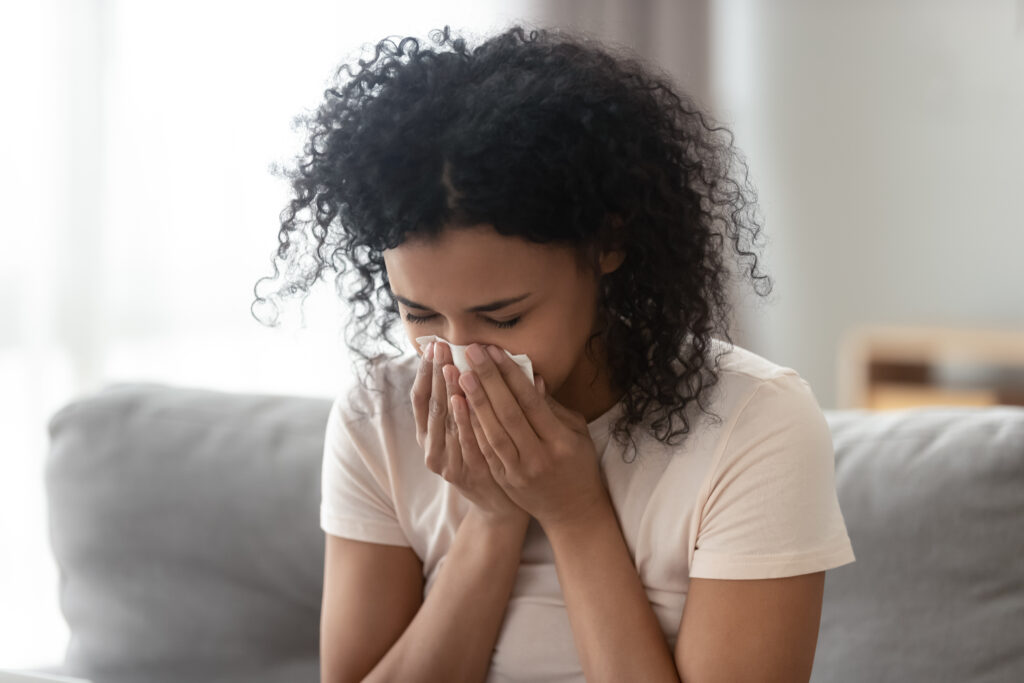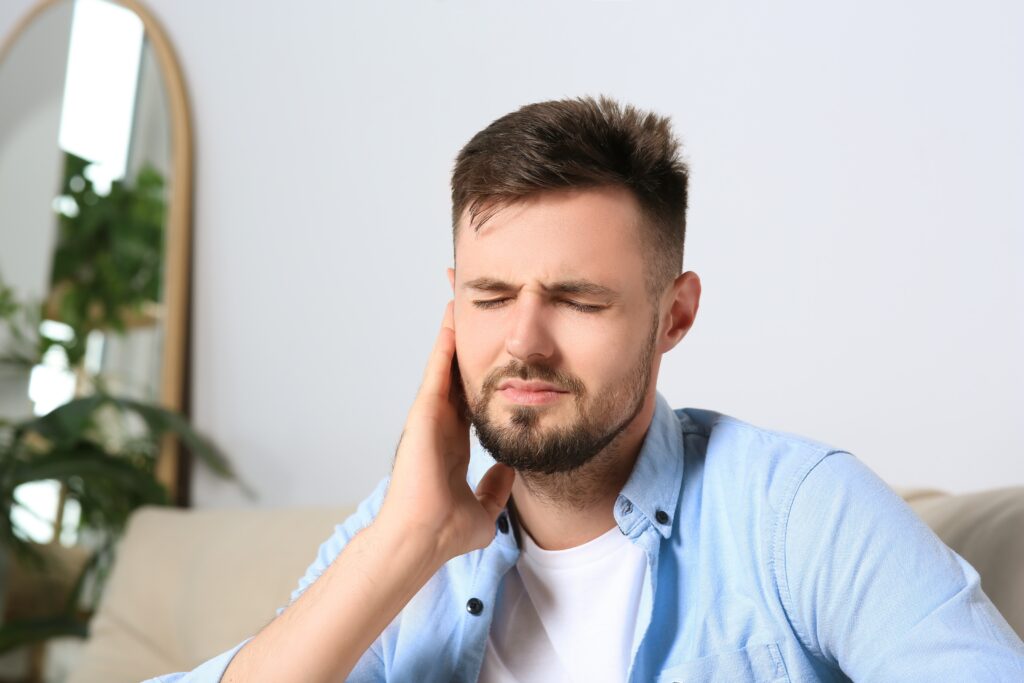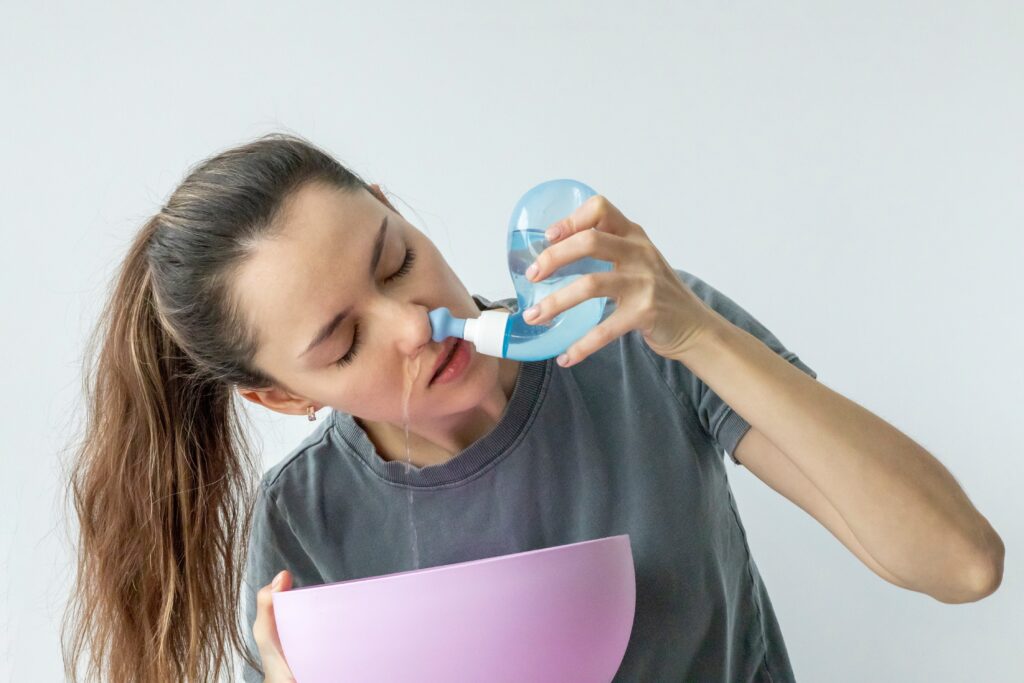October 6, 2023
How to Get Rid of a Sore Throat and Clogged Ears
Having a sore throat and clogged ears simultaneously usually means you have a specific illness or condition, such as the common cold. Uncovering the root cause of these symptoms can help you find the correct treatment to start feeling better and get back to your usual activities.
Here’s how to get rid of a sore throat and clogged ears and how to contact Healthcare Associates of Texas if you need help relieving these symptoms.
Causes of Sore Throat and Ear Pain
A sore throat and clogged ears are common symptoms of a cold. If you have a cold, your symptoms will usually peak within two to three days before gradually stopping. The following conditions are other possible causes of sore throat and ear pain.
Allergies
 Any allergen—such as pollen or pet dander—can cause the mucus membranes in your nose and ears to become inflamed, which may trigger ear pain. Allergies can also cause extra mucus to drain down your throat to cause a sore throat. If allergies are causing your symptoms, you may also experience sneezing, watering eyes, fever, and stuffy nose.
Any allergen—such as pollen or pet dander—can cause the mucus membranes in your nose and ears to become inflamed, which may trigger ear pain. Allergies can also cause extra mucus to drain down your throat to cause a sore throat. If allergies are causing your symptoms, you may also experience sneezing, watering eyes, fever, and stuffy nose.
Strep Throat
A sore throat that comes on very quickly may indicate you have strep throat caused by a bacteria called group A Streptococcus. This bacteria can travel into your ears to cause clogged ears and ear pain. Other symptoms of strep throat include fever, swollen lymph nodes in the neck, and white patches on the tonsils.
Chronic Sinusitis
Chronic sinusitis occurs when your sinus cavities stay inflamed for at least 12 weeks. The inflammation in your sinuses can lead to postnasal drip that irritates the throat, along with pain in the face that may affect the ears. Other symptoms of a sinus infection include toothaches, cough, and bad breath.
Tonsillitis
Tonsillitis is the inflammation of the tonsils. Your tonsils can become inflamed after having a bacterial or viral illness, such as the common cold. If you have tonsillitis, you may also have fever, ear pain or clogged ears, and swollen lymph nodes in the neck.
Mono
Mono is short for mononucleosis, an illness caused by the Epstein-Barr virus (EBV). EBV spreads mainly through saliva and produces symptoms that can last for several weeks.  If your sore throat and clogged ears are caused by mono, you may also experience weakness, fatigue, and swollen lymph nodes.
If your sore throat and clogged ears are caused by mono, you may also experience weakness, fatigue, and swollen lymph nodes.
Tooth Infection
A tooth infection or abscess can cause the gums and tissues around the affected tooth to become irritated and inflamed. The pain it causes can radiate to your throat, neck, and jaw, depending on where the tooth is located. Other symptoms of a tooth infection include fever, pain when chewing, and swelling in the cheek.
Irritants
Exposure to certain irritants can cause your nose, throat, and mucus membranes to become inflamed, leading to a sore throat and ear pain. Smoke, harsh cleaning products, and paint thinner are some of the many irritants that can cause these symptoms.
Treatments for Sore Throat and Ear Pain
Many at-home and over-the-counter (OTC) remedies may help relieve sore throat and ear pain. The key to finding the correct treatment is knowing what’s causing your symptoms. For example, you can use OTC cold medicine to find relief from the common cold.
At-Home Remedies
Try the following home remedies if you think you may have a cold or a throat, sinus, or ear infection:
- OTC medicines for pain, fever, or sore throat, such as acetaminophen or ibuprofen
 OTC antihistamine, if you have allergies
OTC antihistamine, if you have allergies- OTC medicine for sore throat, such as throat spray or lozenges (cough drops).
- Salt-water solution for gargling
- Humidifier, which can help your throat and nasal passages stay moist
- Honey mixed into an herbal tea, such as peppermint or chamomile tea
- Broth or soup
- Spicy foods such as cayenne pepper or hot sauce (these foods may help open your nasal passages and reduce pain)
- Ice chips or popsicles
- Rest and relaxation, which promotes healing
Medical Treatments
You may need prescription drugs or other medical treatments if your symptoms do not go away or start to improve after one week. Medical treatments for a sore throat and clogged ears will vary depending on the root cause of your symptoms. These treatments include:
- Antibiotics if you have a bacterial infection such as strep throat
- Corticosteroid for severe allergies
- Medications for severe acid reflux
- Surgery to remove the tonsils if you have severe tonsillitis
- Dental care from a dentist if you have a tooth infection
When to See a Doctor
Make an appointment with your doctor if your sore throat and ear pain don’t go away after one week or if home remedies aren’t improving your symptoms. It’s time to see a doctor if you have the following:
- A weakened or compromised immune system
- Dizziness
- Stiff neck
- High fever
- Severe ear or throat pain
- Blood or pus coming out of the ear
- Frequent acid reflux
Your doctor can perform an exam, talk to you more about your symptoms, and recommend the best treatment that may help you find relief.
Request an appointment with Healthcare Associates of Texas today to receive treatment for any medical condition, including symptoms such as a sore throat and clogged ears. We offer a variety of primary care services, including wellness exams, screenings, and more.
References
- “Common Cold.” Centers for Disease Control and Prevention, June 27, 2023. https://www.cdc.gov/antibiotic-use/colds.html.
- “Strep Throat: All You Need to Know.” Centers for Disease Control and Prevention, January 6, 2023. https://www.cdc.gov/groupastrep/diseases-public/strep-throat.html.
- “Chronic sinusitis.” NCBI bookshelf. Accessed September 21, 2023. https://www.ncbi.nlm.nih.gov/books/NBK441934/.
- “Epstein-Barr and Infectious Mononucleosis (MONO).” Centers for Disease Control and Prevention, September 28, 2020. https://www.cdc.gov/epstein-barr/index.html.
DISCLAIMER
The information featured in this site is general in nature. The site provides health information designed to complement your personal health management. It does not provide medical advice or health services and is not meant to replace professional advice or imply coverage of specific clinical services or products. The inclusion of links to other web sites does not imply any endorsement of the material on such websites.



